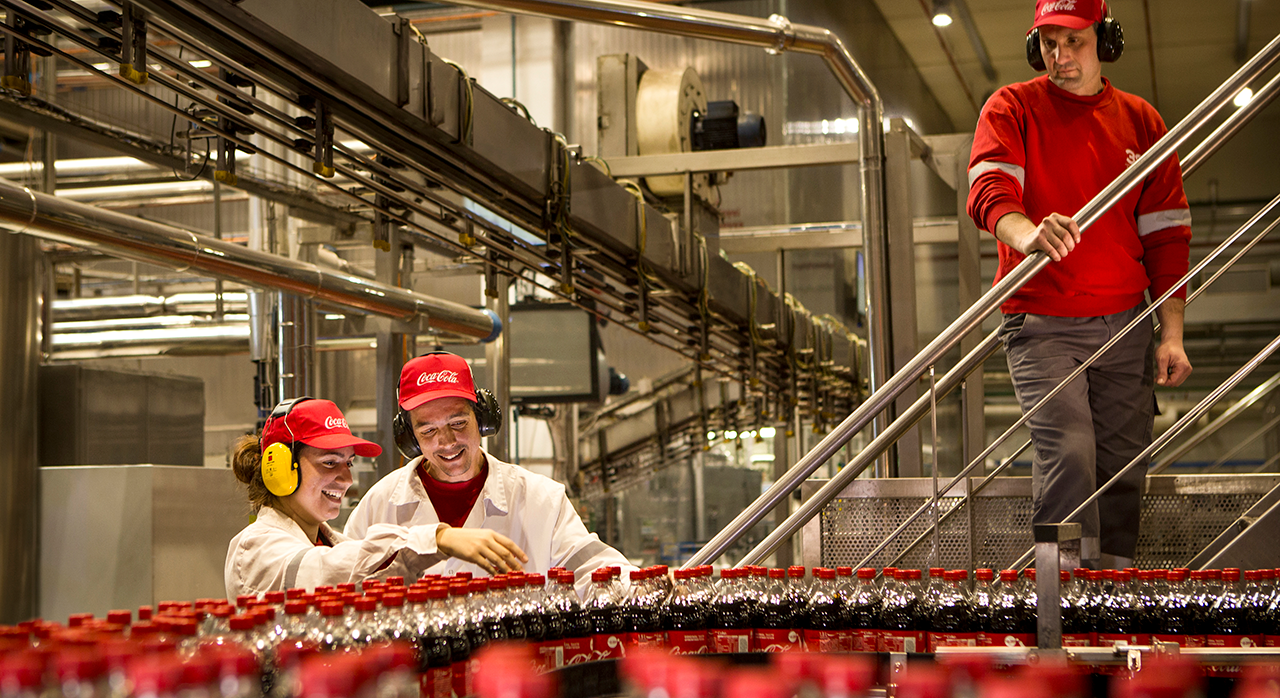A healthy agricultural supply chain is essential to the well-being of the communities in which we operate, and is critical to the success of our business. Our approach to sustainable agriculture is founded on principles to protect the environment, uphold human and workplace rights and help build more sustainable communities. We seek to mitigate business risk by addressing challenges to the availability, quality and safety of agricultural ingredients; to meet consumer demand for products that align with a healthy and sustainable lifestyle; and to balance the costs of sustainability by leveraging relationships and initiating new opportunities as they make sense. Central to this approach is The CocaCola System overall sustainability aspiration to grow our business by making a positive difference in the communities we serve.
To meet the expectations of our consumers, customers, other stakeholders and enable the continued growth of the Company, it is imperative we maintain a secure, sustainable supply of the agricultural ingredients that are essential to our brands. To this end, The CocaCola Company on behalf of the Coca-Cola System has developed a set of principles (which set expectations of our agricultural ingredient suppliers, to address sustainability challenges specific to agriculture. As of April 2021 the Coca-Cola Company updated the policies to a more extended version of guidelines and we now refer across The Coca-Cola System as the Principles of Sustainable Agriculture (PSA).
We believe the PSA provide a mutually beneficial foundation for the Company and its partners in the agricultural supply chain.
Coca-Cola Hellenic, as part of The Coca-Cola System, we fully embraced the new guidelines. As of April 2021 the PSA is considered our prevailing Supplier Guidance and in 2021 we have completed the engagement of our supply base to the new elements added in the PSA in comparison to previous sustainable agriculture programs.
Agriculture is at the heart of the sustainability challenge. Population growth and increasing standards of living create additional demand for food and agricultural products. In an era marked by scarcer resources, greater demand and price volatility, water, food and energy demands increasingly intersect with businesses, communities and farmers.
Currently, suppliers to The CocaCola System and those authorised by The CocaCola Company, are required to meet our Principles for Sustainable Agriculture (PSA) which communicate our values and expectations of compliance with all applicable laws and emphasise the importance of responsible workplace practices that respect human rights. The PSA expand on the our SGPs (Supplier Guiding Principles) and provide specific guidance to our suppliers of agricultural ingredients. These Principles establish the framework for defining our commitment to sustainable sourcing and are integrated into internal governance routines and procurement processes.
The CocaCola Company and the Bottlers we recognise that sustainable sourcing poses new challenges and we intend to work collaboratively with our suppliers on the journey ahead to ensure that all agricultural ingredients are sourced sustainably. We encourage all our suppliers to work continuously towards more sustainable practices and to uphold the following Principles for Sustainable Agriculture:
Human and Workplace Rights
The Human and Workplace Rights principles apply to all workers on the farm, industrial processes associated or transport services. All direct suppliers, intermediary processors, producing farms and labor agencies are expected to respect human rights and the below principles in line with international Human Rights principles and Coca-Cola Hellenic Beverage Company Supplier Guiding Principles.
1. Freedom of Association and Collective Bargaining: Respect workers right to form, join or not to join a labor union without fear of reprisal, intimidation or harassment. Where workers are represented by a legally recognized union, establish a constructive dialogue with their freely chosen representatives and bargain in good faith with such representatives.
2. Prohibit Child Labor, Forced Labor and Abuse of Labor: Adhere to minimum age provisions for all permanent, temporary or seasonal workers in accordance with all applicable laws and regulations. Minimum age for hazardous work is 18. Prohibit the use of all forms of forced labor, including prison labor, indentured labor, bonded labor, military labor, slave labor or any form of human trafficking. Retention of personal identity documents, recruitment fees or excessive loan terms are prohibited. All children under 15 living on farms have access to schooling.
3. Eliminate Discrimination: Maintain workplaces that are free from any discrimination (examples include: gender, race, religion, culture, health status) or physical, sexual or verbal harassment. Women, minorities, migrant workers, indigenous and tribal populations, and other vulnerable groups are treated fairly and equally. The basis for recruitment, placement, training, compensation and advancement should be qualifications, performance, skills and experience.
4. Work Hours and Livelihoods: Operate in full compliance with all applicable wage, work hours, overtime and benefits laws and regulations. Compensate workers relative to the industry and local labor market. Farmer income and worker wages should meet at least basic income needs and, where available, be benchmarked against living wage estimates. Workers are offered opportunities to develop their skills and capabilities and provided advancement opportunities where possible.
5. Health and Safety: Ensure productive workplace by minimizing the risk of accidents, injury and exposure to health risks. Occupational, health and safety risks are managed through Health & Safety management plans. Provide and require the use of Personal Protective Equipment (PPE). Provide trainings on health and safety, including the use of PPE. All workers have access to drinking water, toilets and hygiene facilities and are made aware of medical care facilities. All worker accommodations provided by employer are safe, sanitary and in line with applicable standards outlined in ILO Recommendation 115 (Workers Housing).
6. Grievance Procedure and Remedy: Provide workers and communities with a mechanism to express grievances anonymously without fear of reprisal, and ensure concerns are appropriately addressed in a timely manner. Ensure remediation and grievance procedure are aligned to UN Guiding Principles on Business and Human Rights.
7. Community and Traditional Rights: Recognize and safeguard the rights of indigenous peoples and local communities to land and natural resources, with particular attention to marginalized groups, such as women and ethnic minorities. Where applicable, uphold principle of Free, Prior and Informed Consent (FPIC). Maintain positive community relations and contribute to local economic development.
Environment and Ecosystems
Agriculture and livestock production should be resilient, environmentally sustainable, cause minimal damage, and, where possible, be restorative to the surrounding environment in all areas and activities on the farm.
8. Water Management: Ensure long-term sustainability of water resources in balance with community and ecosystem needs by measuring their water use and quality where crops are irrigated, maximizing water use efficiency and minimizing water quality impacts from wastewater discharges, erosion and nutrient/agrochemical runoff. Farms located in water-stressed areas actively manage their source water to highest standards (e.g. using Alliance for Water Stewardship) and build resilience to climate change by managing for uncertainty, extremes and gradual change. Farms avoid converting important water-related areas (e.g. wetlands).
9. Energy Management and Greenhouse Gas Reduction: Avoid contributing to climate change by measuring energy use and greenhouse gas emissions (including emissions from deforestation and other land use change), setting GHG reduction targets, maximizing energy efficiency and the use of renewable energy, reducing emissions from agricultural practices and livestock farms, and avoiding air pollution.
10. Climate Change Resilience: Farms have assessed climate-related risks and have climate adaptation and resilience plans in place to appropriately address current and anticipated impacts of climate change while avoiding additional harm to nature or people.
11. Waste Management: Separate, classify, safely store, transport and dispose of all waste. Reduce, reuse and recycle waste, where possible, and no waste is incinerated on farm or disposed via freshwater ecosystems (rivers, lakes, etc.). Leakage of plastics, liquid waste or manure from farms into soil or watercourses are prevented. Containers for hazardous materials are disposed of appropriately. There are measures to properly manage organic waste with the goal of enhancing soil health, including through composting. All waste is managed separately according to its classification and disposed of in an authorized place or through waste disposal authorized service providers.
12. Conservation of Forests: Promote sustainable forest management and help protect woodlands from deforestation and illegal harvesting. New production areas are not established in natural habitats/ecosystems including forests or high-value conservation areas and do not cut through wildlife corridors or routes used for migration. Forests are not cut or burned for conversion to new production. There is no deliberate use of fire for land clearance.
13. Conservation of Natural Habitats, Biodiversity and Ecosystems: Identify and help protect natural habitats from conversion. Natural ecosystems are not altered or burned for conversion to new production. Promote and protect natural habitats, protected areas and biodiversity, including natural pollinators, through the protection, and where possible, restoration of ecosystem services through approaches that build resilience to shocks and longer-term climate stressors. Farms take special measures to protect threatened or endangered species.
14. Soil Management: Maintain and improve soils and prevent degradation, minimize greenhouse gas emissions, protect soil biodiversity and enhance soil structure. Implement a Nutrient Management Plan based on an integrated Nutrient Management approach and incorporate the ‘Four Rs of nutrient stewardship’ to maintain and enhance soil quality and minimize impacts on air, water and biodiversity.
15. Agrochemical Management: Follow national and/or local regulations and label requirements for safe and proper use of all agrochemicals, in accordance with label directions, to ensure proper protection of farm personnel and the environment. Do not use or store agrochemicals that are banned in the country of operation or are prohibited under international treaty. All agrochemicals are managed in a manner that respects Maximum Residue Limits (MRLs) of the countries where agricultural materials are grown and – when possible – of the countries where they are being used as ingredients to help prevent negative impacts on human health. All products used to protect crops from pest pressures, including, but not limited to, insects, weeds and diseases, are clearly documented and are part of an Integrated Pest Management System. All use of plant protection products is clearly justified.
Animal Health and Welfare
Animal health and welfare principles apply to all animals on a farm, including animals used for harvest or transport work, or as livestock to produce agricultural ingredients or products for the Coca-Cola System.
16. Animal Health and Welfare: Animals are treated with care, understanding and respect by qualified personnel. Ensure animals are healthy and there is an effective health care program in place. Animal Welfare practices on the farm follow the OIE Terrestrial Animal Health Code including the ‘five freedoms’: freedom from hunger and thirst; freedom from discomfort; freedom from pain, injury or disease; freedom to express normal behavior; freedom from fear and distress. Workers receive regular training on animal health and welfare expectations.
17. Animal Nutrition and Feed Management: Animals are provided with the feed and water of suitable quantity and quality. Feed suppliers can track
ingredients to the sourcing farm or region. The nutrient provision, sustainability and safety of feed is ensured by ensuring farms producing ingredients for animal feed meet the PSA. Feed is stored in conditions to ensure quality and avoid contamination.
18. Manure Management: Manage manure to avoid contaminations to product or environment and to avoid discomfort to animals. Incorporate manure-management best practices to minimize environmental impacts and limit nutrient losses in collection, storage, treatment, transfer and utilization.
19. Transportation Management: Organize transportation of animals to minimize animal discomfort, to avoid creation of injury and distress and to ensure no disease transmission.
Farm Management Systems
Management systems are in place and records maintained to help ensure: the health, safety and integrity of all products and ingredients; and the business integrity and economic sustainability of the farm system.
20. Business Integrity and Economic Sustainability: Conduct business with integrity, respecting relevant laws and prohibiting bribes and fraudulent practices. Know the cost of production, and manage farms to increase productivity and profitability, helping ensure long-term viability and improve resilience to climate, market and other changes. Work collaboratively with others to address shared challenges and broaden their sustainability practices.
21. Food Safety and Hygiene: Food safety and hygiene processes are in place in accordance and compliance with all applicable laws and regulations and to ensure safety and quality of food in the supply chain. Appropriate processes and risk assessments are in place to avoid and minimize the bio-chemical and physical risks through production and handling.
22. Harvest and Postharvest Handling: Manage harvest and postharvest packing, storage and transportation processes effectively to minimize losses and waste along the value chain.
23. Reproductive Material Identity, Selection and Handling: Ensure crop and livestock selection is suited to local conditions (climate, water availability, pest pressure, etc.) to help ensure sustainable harvests and productivity over time. Know the animal and crop species and varieties, if applicable. Farms maintain records and are able to evidence their GMO/GMO-free status. Where GMOs are used, this is in line with regulations. Natural genetic diversity is conserved.
24. Management Systems, Record Keeping and Transparency: Develop a system to manage objectives, procedures and practices and to track sustainability practice improvement over time. Maintain records of practices and procedures, as well as proof of compliance with all applicable laws and regulations. Increase transparency throughout the supply chain and work collaboratively to adopt and broaden sustainable practices. Set targets for improvement. Provide support to deliver and track performance over time. Support traceability from farm to bottler.
8 April 2021
1 http://www.ilo.org
2 FAO Good Agricultural Practices





